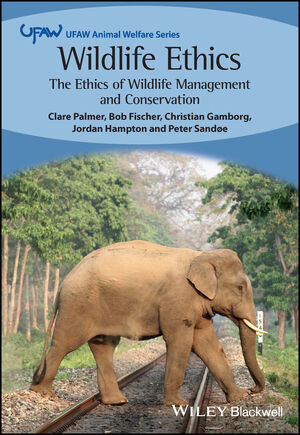-

- |
- Accueil
- |
- Livres
- |
- Revues
- |
- Thèses
- |
- Patrimoine
- |
-
Ressources
Autres écoles vétérinaires
-

- |
- Accueil
- |
- Livres
- |
- Revues
- |
- Thèses
- |
- Patrimoine
- |
- Ressources

Wildlife ethics : the ethics of wildlife management and conservation

Palmer, Clare ; Fischer, Bob ; Gamborg, Christian ; Hampton, Jordan ; Sandoe, Peter
Universities Federation for Animal Welfare (UFAW)
2023
9781119611219
D-01-00-ebook
Écosystème ; Biodiversité ; Bioéthique ; Faune sauvage ; Conservation des espèces ; Étude de cas
A systematic account of the ethical issues related to wildlife management and conservation. Wildlife Ethics is the first systematic, book-length discussion of the ethics of wildlife conservation and management, and examines the key ethical questions and controversies. Tackling both theory and practice, the text is divided into two parts. The first describes key concepts, ethical theories, and management models relating to wildlife; the second puts these concepts, theories, and models to work, illustrating their significance through detailed case studies on controversies in wildlife management and conservation. The book explores pressing topics including human responsibilities due to climate change, tradeoffs when managing zoonotic disease risks, the ethics of the wildlife trade, culling non-native species, indigenous wildlife use, and zoo-based conservation programs. Readers are encouraged to explore different ways of valuing wild animals and their practical implications. This essential text: - Explains and explores relationships between valuing biodiversity, human utility, ecosystems, species, and animal welfare. - Describes established approaches to wildlife management, such as sustainable use, and emerging concepts, such as compassionate conservation. - Discusses key ethical theories, including utilitarianism, ecocentrism, and animal rights. - Offers a practical model of how to analyze ethical issues in wildlife management and conservation.
Wildlife Ethics: The Ethics of Wildlife Management and Conservation is an accessible introduction to complex ethical issues, making the book an important resource for students in fields such as conservation biology, ecology, environmental science and policy, game management, public health and veterinary medicine. It will also be an invaluable tool for wildlife managers, conservationists, One Health practitioners, practicing veterinarians and animal rehabilitation staff, contemporary wildlife professionals and other stakeholders.
Url / Doi : https://vet-alfort.idm.oclc.org/login?url=https://onlinelibr...
Localisation : Wiley-UBCM
Collection : UFAW Animal Welfare
Type de fond : Fonds dématérialisé
1 Introduction - 2 Valuing Wildlife - 3 The Value of Wildness and Ecosystems - 4 The Value of Species and Biodiversity - 5 Valuing Wild Animals as Individuals - 6 The Role of Ethical Theories - 7 Wildlife Management and Conservation Models - 8 Recent Movements in Wildlife Management - 9 Moral Disagreement about Wildlife.
10 Conservation via Commodification: A Legal Trade in Rhino Horn? - 11 Hyperabundant Native Species: Deer in the Suburbs - 12 “Invasive” Animals: Predator Free New Zealand - 13 Indigenous Wildlife Use: Whaling and the Makah People - 14 Ex situ Conservation: The Giant Panda - 15 Wildlife Research: Toe- Clipping - 16 Zoonotic Disease: Bad Bats? - 17 The Cost of Green Energy: Wildlife and Wind Power - 18 Climate Change Interventions: Feeding Polar Bears? 19 Conclusion: Wildlife Ethics – The Future.
Index